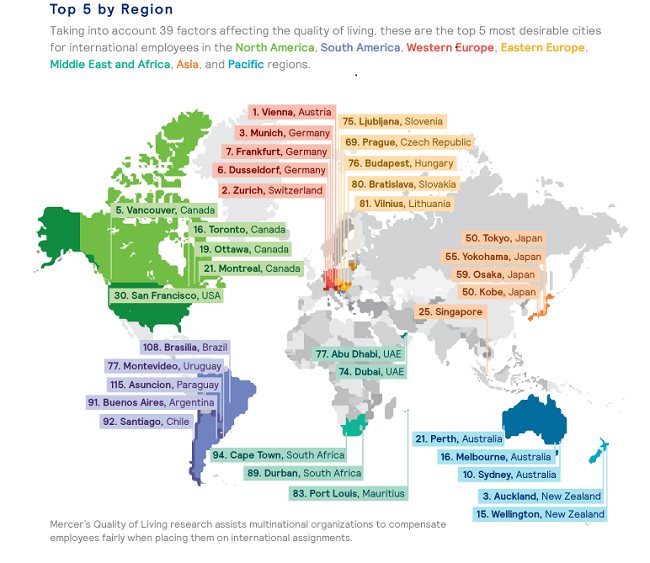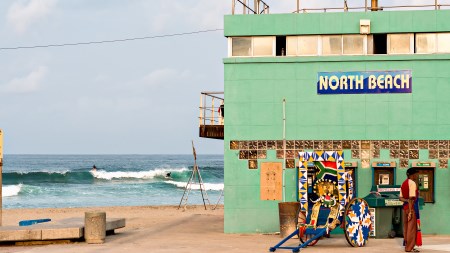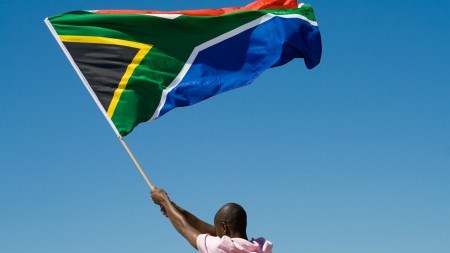With amazing weather all year round, the warm Indian Ocean, great schools, free-flowing traffic and excellent value for money in the property market, Durban boasts a lifestyle like no other.
As a Durban-based company, we might be accused of being slightly biased in the way we view our city, but now an authoritative study has confirmed (again) what we’ve long suspected - Durban is South Africa's best city to live in.
Mercer’s 20th annual Quality of Living Ranking has rated Durban (89) the South African city with the highest quality of living. Other South African cities to make the top 100 are Cape Town (94) and Johannesburg (95).
Durban was also rated Africa’s second-best city to live in, behind the Mauritian city of Port Louis (83). At the other end of the scale, N’Djamena (226), Khartoum (227) and Bangui (230) were the lowest ranked in the African region. Persistent political instability, poverty, extreme climates and lack of appropriate infrastructure investments means these cities have the lowest quality of living worldwide.
Globally, the top 10 list is dominated by cities in Europe, despite political and economic volatility caused by Brexit. However, Mercer points out that cities in emerging markets like ours, though challenged by economic and political turmoil , are catching up with top ranking cities following decades of investing in infrastructure, recreational facilities and housing in order to attract talent and multinational businesses.
The Top 10 City Rankings Worldwide
1. Vienna (Austria)
2. Zurich (Switzerland)
3. Auckland (New Zealand)
4. Munich (Germany)
5. Vancouver (Canada)
6. Dusseldorf (Germany)
7. Frankfurt (Germany)
8. Geneva (Switzerland)
9. Copenhagen (Denmark)
10. Basel (Switzerland)
10. Sydney (Australia)

Mercer’s authoritative survey is one of the world’s most comprehensive and is conducted annually to enable multinational companies and other organisations to compensate employees fairly when placing them on international assignments.
Mercer evaluates local living standards according to 39 factors, grouped in 10 categories:
• Political and social environment (political stability, crime, law enforcement, etc.).
• Economic environment (currency exchange regulations, banking services).
• Socio-cultural environment (media availability and censorship, limitations on personal freedom).
• Medical and health considerations (medical supplies and services, infectious diseases, sewage, waste disposal, air pollution, etc.).
• Schools and education (standards and availability of international schools).
• Public services and transportation (electricity, water, public transportation, traffic congestion, etc.).
• Recreation (restaurants, theatres, cinemas, sports and leisure, etc.).
• Consumer goods (availability of food/daily consumption items, cars, etc.).
• Housing (rental housing, household appliances, furniture, maintenance services).
• Natural environment (climate, record of natural disasters).
Comparing property markets - JHB vs CT vs DBN
Median Prices
Cape Town : R2 800 000
Johannesburg: R1 690 000
Durban: R1 695 000
Year on year change in asking price (February)
Cape Town : 15%
Johannesburg: 4%
Durban: 4%
Median Prices by property type:
Cape Town
House: R2 950 000
Apartment: R2 680 000
Complex: R1 950 000
Johannesburg:
House: R2 200 000
Apartment: R1 099 000
Complex: R1 420 000
Durban
House: R2 150 000
Apartment: R1 095 000
Complex: R1 850 000




